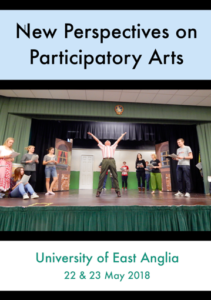 At the New Perspectives on Participatory Arts conference at University of East Anglia, 22-23 May, the programme includes a roundtable discussion on Norfolk community arts, featuring a set of terrific artist and cultural workers.
At the New Perspectives on Participatory Arts conference at University of East Anglia, 22-23 May, the programme includes a roundtable discussion on Norfolk community arts, featuring a set of terrific artist and cultural workers.
They will be discussing their practice on Wednesday 23 May, 3.45-5pm.
- Michael Corley, Norfolk and Norwich Festival
- Sian Croose, The Voice Project, Norwich
- Dr Sarah Lowndes, Kunsthalle Cromer.
I have sent all three a set of questions and points for discussion, copied below. I thought it might be of intent for people to see the ends of areas we will be talking and thinking about.
Lovely to be ending the New Perspectives on Participatory Arts conference @uniofeastanglia on a local note: many thanks to our Norfolk Community Arts panelists Sian Croose from @voiceproject, @LowndesSarah and Michael Corley from @NNFest pic.twitter.com/OLa2ARiXYG
— AHRC Connect (@ahrcconnect) May 23, 2018
Could you each in turn take a few minutes to introduce yourself, your organisation/project. I think people will be interested in eg the following:
- Your career / education / creative trajectory, and how you got to being where you are.
- Tell us a little about 1 or 2 major arts activities you have been involved in or led.
How do you describe what you do? (Do you have a job title?)
People like to know about funding! Without breaching your professional secrets and confidential arrangements, can you tell us something about yours—who pays you for your work?
Local identity and a sense of place. Do you think it important to work with communities in Norfolk and East Anglia? In what ways does what you do draw on the local area (this might be subject matter, venue, art location, etc)? What, if anything, is Norfolk about your practice? Are there any drawbacks to this (parochialism, say)? Is your practice transferable elsewhere?
To what extent does your community or participatory practice inform or draw on your own creative practice as an artist, where relevant?
Digital technologies, digital audiences. How far does your work engage with these, or do you think of your work as a congregating activity, social rather than virtual?
Is your art or event a special thing? Transformative? If so, how sustainable is it (how do you keep being special)?
Do you think (community) art contributes to good health and well-being? Can you show an instance of that, from your own practice?
This conference is called New Perspectives. What do you think is ‘new’ in what you are doing, or have done?
 Anything else you think important to say?
Anything else you think important to say?
Open discussion up to floor.
